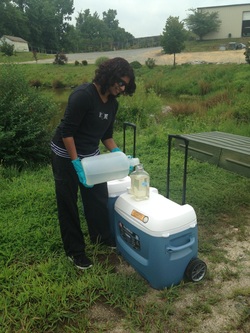For my doctoral work, I examined the use of dissolved organic carbon by heterotrophic bacteria in cold polar oceans near Palmer Station, Antarctica and the Arctic Ocean.
As a postdoc at Virginia Tech I studied bacterial and archaeal nitrogen-metabolism in recycled irrigation ponds in Virginia. In particular I'm examining abundance and diversity of ammonia oxidizing prokaryotes.
As a postdoc at Rutgers University, I am studied the microbial communities of Arctic permafrost and tundra as it melts in a warming climate.
I am currently a scientist for a growing microbiome company in Cambridge, MA. Dysbiosis has created a whole host of health issues and our company seeks to develop ecobiotic therapies in order to restore balance to the human microbiome.
As a postdoc at Virginia Tech I studied bacterial and archaeal nitrogen-metabolism in recycled irrigation ponds in Virginia. In particular I'm examining abundance and diversity of ammonia oxidizing prokaryotes.
As a postdoc at Rutgers University, I am studied the microbial communities of Arctic permafrost and tundra as it melts in a warming climate.
I am currently a scientist for a growing microbiome company in Cambridge, MA. Dysbiosis has created a whole host of health issues and our company seeks to develop ecobiotic therapies in order to restore balance to the human microbiome.

Ammonia Oxidizing Microbes in Recycled Irrigation Waters
My first postdoc project examined ammonia oxidizing archaea and bacteria in recycled irrigation waters.
Worldwide, agriculture accounts for almost 70% of all freshwater use. Now, freshwater is a rapidly depleting resource and the agricultural sector must begin to recycle irrigation water in order to ensure food security for the future. However, recycled irrigation water is source of microbes, both pathogenic and helpful, to crops and plants. My project examines the microbes in irrigation water, specifically ammonia oxidizing prokaryotes, in order to boost plant production. By combining field sampling and current molecular techniques in the lab, I can address the larger issue of freshwater conservation and plant health as they relate to recycled irrigation water.
My first postdoc project examined ammonia oxidizing archaea and bacteria in recycled irrigation waters.
Worldwide, agriculture accounts for almost 70% of all freshwater use. Now, freshwater is a rapidly depleting resource and the agricultural sector must begin to recycle irrigation water in order to ensure food security for the future. However, recycled irrigation water is source of microbes, both pathogenic and helpful, to crops and plants. My project examines the microbes in irrigation water, specifically ammonia oxidizing prokaryotes, in order to boost plant production. By combining field sampling and current molecular techniques in the lab, I can address the larger issue of freshwater conservation and plant health as they relate to recycled irrigation water.
Seres Therapeutics
http://www.serestherapeutics.com/
Mission Statement:
Our mission is to transform the lives of patients worldwide with revolutionary microbiome-based therapeutics.
Seres Therapeutics is creating a new class of medicines to treat diseases resulting from functional deficiencies in the microbiome, a condition known as dysbiosisNew insights into the human microbiome are fundamentally reshaping how we understand and treat a wide range of diseases, creating new possibilities for patients not served by current approaches. We are a clinical biopharmaceutical company with a powerful platform to discover and develop drugs to treat diseases in multiple areas of medicine that arise from dysbiosis.
Our team of drug development experts discovers and designs new medicines using our proprietary microbiome therapeutics platform.
We pinpoint functional differences between a healthy and dysbiotic microbiome, and rationally design potential Ecobiotic® drugs. These therapeutics are ecological compositions made up of beneficial organisms that are designed to target functional deficiencies and reestablish keystone features of a healthy microbiome. Ourdiscovery efforts currently span metabolic, inflammatory, and infectious diseases.
Fast Facts:
http://www.serestherapeutics.com/
Mission Statement:
Our mission is to transform the lives of patients worldwide with revolutionary microbiome-based therapeutics.
Seres Therapeutics is creating a new class of medicines to treat diseases resulting from functional deficiencies in the microbiome, a condition known as dysbiosisNew insights into the human microbiome are fundamentally reshaping how we understand and treat a wide range of diseases, creating new possibilities for patients not served by current approaches. We are a clinical biopharmaceutical company with a powerful platform to discover and develop drugs to treat diseases in multiple areas of medicine that arise from dysbiosis.
Our team of drug development experts discovers and designs new medicines using our proprietary microbiome therapeutics platform.
We pinpoint functional differences between a healthy and dysbiotic microbiome, and rationally design potential Ecobiotic® drugs. These therapeutics are ecological compositions made up of beneficial organisms that are designed to target functional deficiencies and reestablish keystone features of a healthy microbiome. Ourdiscovery efforts currently span metabolic, inflammatory, and infectious diseases.
Fast Facts:
- Founded: 2010 by Flagship VentureLabs®
- Location: Cambridge, MA
- Our Name: Seres is the plural noun of the word Sere, defined as a series of ecological communities formed in ecological succession
- CEO: Roger Pomerantz, M.D.
- Lead Program: SER-109 for the prevention of recurrent Clostridium difficile infection; designated Breakthrough Therapy by FDA
